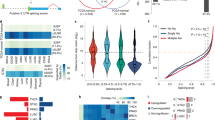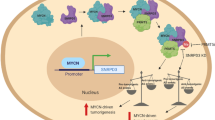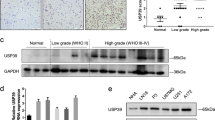Abstract
MRPL33 gene encodes a large mitoribosomal subunit protein, which may be involved in mitochondrial translation. Although two splice variants of MRPL33 have been described, its splicing regulation remains elusive. Here we observed that inclusion of alternative exon 3 was greatly promoted in a panel of human cancer cells. Depletion of the exon 3-containing long isoform of MRPL33 (MRPL33-L) led to impaired proliferation and increased apoptosis in cancer cell lines and in a xenograft model. MRPL33-L knockdown could also induce mitochondrial dysfunction including increased accumulation of reactive oxygen species, decreased ATP production and 16 S rRNA levels. We further showed that alternative splicing of MRPL33-L pre-mRNA is regulated by hnRNPK and that knocking down hnRNPK could phenocopy MRPL33-L depletion. More importantly, overexpression of MRPL33-L could increase tumorigenic potential of hnRNPK-depleted cancer cells, likely indicating that hnRNPK mediates tumorigenesis through splicing regulation of MRPL33 pre-mRNA. Finally, we found that inclusion of MRPL33 exon 3 was promoted in human colorectal cancer tissues and this was correlated with hnRNPK levels. In summary, our findings underscore the biological significance of MRPL33-L and hnRNPK in the tumor formation and identifies hnRNPK as a critical splicing regulator of MRPL33 pre-mRNA in cancer cells.
This is a preview of subscription content, access via your institution
Access options
Subscribe to this journal
Receive 50 print issues and online access
$259.00 per year
only $5.18 per issue
Buy this article
- Purchase on Springer Link
- Instant access to full article PDF
Prices may be subject to local taxes which are calculated during checkout







Similar content being viewed by others
Accession codes
References
Hanahan D, Weinberg RA . Hallmarks of cancer: the next generation. Cell 2011; 144: 646–674.
Nunnari J, Suomalainen A . Mitochondria: in sickness and in health. Cell 2012; 148: 1145–1159.
El-Hattab AW, Scaglia F . Mitochondrial cytopathies. Cell Calcium 2016; 60: 199–206.
Gopisetty G, Thangarajan R . Mammalian mitochondrial ribosomal small subunit (MRPS) genes: a putative role in human disease. Gene 2016; 589: 27–35.
Black DL . Mechanisms of alternative pre-messenger RNA splicing. Annu Rev Biochem 2003; 72: 291–336.
Chen M, Manley JL . Mechanisms of alternative splicing regulation: insights from molecular and genomics approaches. Nat Rev Mol Cell Biol 2009; 10: 741–754.
Zhou X, Wu W, Li H, Cheng Y, Wei N, Zong J et al. Transcriptome analysis of alternative splicing events regulated by SRSF10 reveals position-dependent splicing modulation. Nucleic Acids Res 2014; 42: 4019–4030.
Pandit S, Zhou Y, Shiue L, Coutinho-Mansfield G, Li H, Qiu J et al. Genome-wide analysis reveals SR protein cooperation and competition in regulated splicing. Mol Cell 2013; 50: 223–235.
Xiao R, Tang P, Yang B, Huang J, Zhou Y, Shao C et al. Nuclear matrix factor hnRNP U/SAF-A exerts a global control of alternative splicing by regulating U2 snRNP maturation. Mol Cell 2012; 45: 656–668.
David CJ, Manley JL . Alternative pre-mRNA splicing regulation in cancer: pathways and programs unhinged. Genes Dev 2010; 24: 2343–2364.
Danan-Gotthold M, Golan-Gerstl R, Eisenberg E, Meir K, Karni R, Levanon EY . Identification of recurrent regulated alternative splicing events across human solid tumors. Nucleic Acids Res 2015; 43: 5130–5144.
Sebestyen E, Zawisza M, Eyras E . Detection of recurrent alternative splicing switches in tumor samples reveals novel signatures of cancer. Nucleic Acids Res 2015; 43: 1345–1356.
Nazim M, Masuda A, Rahman MA, Nasrin F, Takeda JI, Ohe K et al. Competitive regulation of alternative splicing and alternative polyadenylation by hnRNP H and CstF64 determines acetylcholinesterase isoforms. Nucleic Acids Res 2016; 45: 1455–1468.
Soldani C, Scovassi AI . Poly(ADP-ribose) polymerase-1 cleavage during apoptosis: an update. Apoptosis 2002; 7: 321–328.
Barboro P, Ferrari N, Balbi C . Emerging roles of heterogeneous nuclear ribonucleoprotein K (hnRNP K) in cancer progression. Cancer Lett 2014; 352: 152–159.
Menezes MJ, Guo Y, Zhang J, Riley LG, Cooper ST, Thorburn DR et al. Mutation in mitochondrial ribosomal protein S7 (MRPS7) causes congenital sensorineural deafness, progressive hepatic and renal failure and lactic acidemia. Hum Mol Genet 2015; 24: 2297–2307.
Llorian M, Schwartz S, Clark TA, Hollander D, Tan LY, Spellman R et al. Position-dependent alternative splicing activity revealed by global profiling of alternative splicing events regulated by PTB. Nat Struct Mol Biol 2010; 17: 1114–1123.
Shnyreva M, Schullery DS, Suzuki H, Higaki Y, Bomsztyk K . Interaction of two multifunctional proteins. Heterogeneous nuclear ribonucleoprotein K and Y-box-binding protein. J Biol Chem 2000; 275: 15498–15503.
Carpenter B, McKay M, Dundas SR, Lawrie LC, Telfer C, Murray GI . Heterogeneous nuclear ribonucleoprotein K is over expressed, aberrantly localised and is associated with poor prognosis in colorectal cancer. Br J Cancer 2006; 95: 921–927.
Carpenter B, MacKay C, Alnabulsi A, MacKay M, Telfer C, Melvin WT et al. The roles of heterogeneous nuclear ribonucleoproteins in tumour development and progression. Biochim Biophys Acta 2006; 1765: 85–100.
Zhou X, Li X, Cheng Y, Wu W, Xie Z, Xi Q et al. BCLAF1 and its splicing regulator SRSF10 regulate the tumorigenic potential of colon cancer cells. Nat Commun 2014; 5: 4581.
Wei N, Cheng Y, Wang Z, Liu Y, Luo C, Liu L et al. SRSF10 plays a role in myoblast differentiation and glucose production via regulation of alternative splicing. Cell Rep 2015; 13: 1647–1657.
Cheng Y, Luo C, Wu W, Xie Z, Fu X, Feng Y . Liver-specific deletion of SRSF2 caused acute liver failure and early death in mice. Mol Cell Biol 2016; 36: 1628–1638.
Wallace L, Mehrabi S, Bacanamwo M, Yao X, Aikhionbare FO . Expression of mitochondrial genes MT-ND1, MT-ND6, MT-CYB, MT-COI, MT-ATP6, and 12 S/MT-RNR1 in colorectal adenopolyps. Tumour Biol 2016; 37: 12465–12475.
Guha S, Goyal SP, Kashyap VK . Genomic variation in the mitochondrially encoded cytochrome b (MT-CYB) and 16 S rRNA (MT-RNR2) genes: characterization of eight endangered Pecoran species. Anim Genet 2006; 37: 262–265.
Acknowledgements
This work was supported by grants from the National Natural Science Foundation 31570818 to Y Feng and 31370786 to Y Feng and 31601170 to N Wei and 31400677 to W Wu and 81372197 to G Wu and also from the ‘Personalized Medicine-Molecular Signature-based Drug Discovery and Development’, Strategic Priority Research Program of the Chinese Academy of Sciences (XDA12010100).
Author information
Authors and Affiliations
Corresponding authors
Ethics declarations
Competing interests
The authors declare no conflict of interest.
Additional information
Supplementary Information accompanies this paper on the Oncogene website
Supplementary information
Rights and permissions
About this article
Cite this article
Liu, L., Luo, C., Luo, Y. et al. MRPL33 and its splicing regulator hnRNPK are required for mitochondria function and implicated in tumor progression. Oncogene 37, 86–94 (2018). https://doi.org/10.1038/onc.2017.314
Received:
Revised:
Accepted:
Published:
Issue Date:
DOI: https://doi.org/10.1038/onc.2017.314
This article is cited by
-
Single-cell RNA binding protein regulatory network analyses reveal oncogenic HNRNPK-MYC signalling pathway in cancer
Communications Biology (2023)
-
Expression and prognosis analysis of mitochondrial ribosomal protein family in breast cancer
Scientific Reports (2022)
-
The cancer-testis lncRNA lnc-CTHCC promotes hepatocellular carcinogenesis by binding hnRNP K and activating YAP1 transcription
Nature Cancer (2022)
-
Systematic analysis of the function and prognostic value of RNA binding protein in head and neck squamous cell carcinoma
European Archives of Oto-Rhino-Laryngology (2022)
-
Alternative splicing of mRNA in colorectal cancer: new strategies for tumor diagnosis and treatment
Cell Death & Disease (2021)



